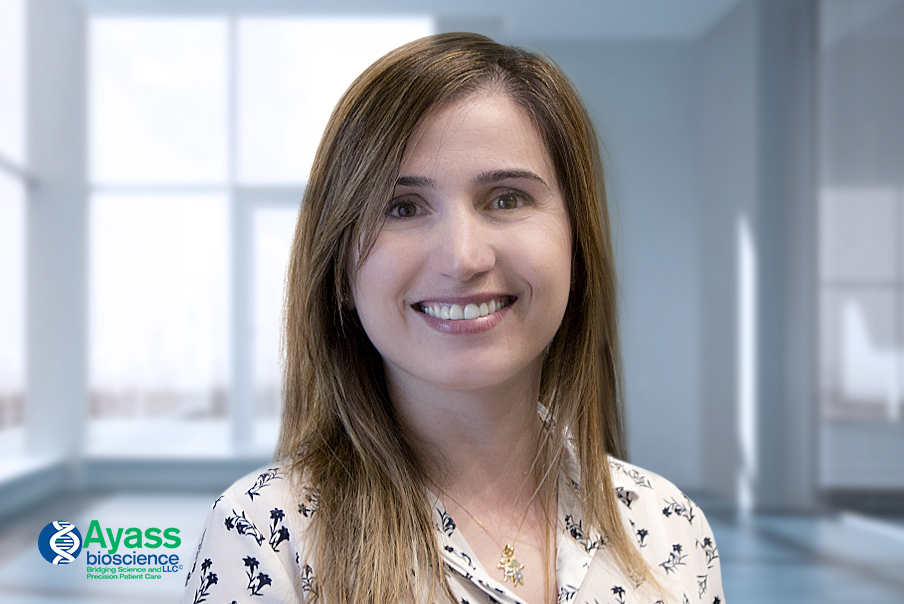
Ayass Bioscience has been a pioneer in implementing artificial intelligence to predict patient outcome. It started with the development of ‘MoNet’, an advanced biological tool that uses CAI (Cognitive Artificial Intelligence) to collect and analyze data from hundreds of molecular tests conducted on thousands of patients at Ayass Bioscience to identify clinical associations between biomarkers and generate a prediction score for an individual’s risk of thrombosis. Lina had the privilege to be part of that project that opened the door for the development of Machine Learning Models for the prediction of patient outcome as it relates to cancer and metastasis. With data produced at an unprecedented rate, the new direction of Ayass Bioscience is to implement such tools to build models for prediction for better patient outcome in other disciplines of medicine such as immunology as well as in the biomedical research conducted.
Lina earned her Bachelor’s and Master’s in Cell Biology at the American University of Beirut in Lebanon. Upon moving to the U.S., Lina received her Ph.D. in Molecular Genetics and Biochemistry at the University of Texas Southwestern Medical Center at Dallas in the laboratory of Nobel laureates Drs. Michael S. Brown and Joseph L Goldstein.
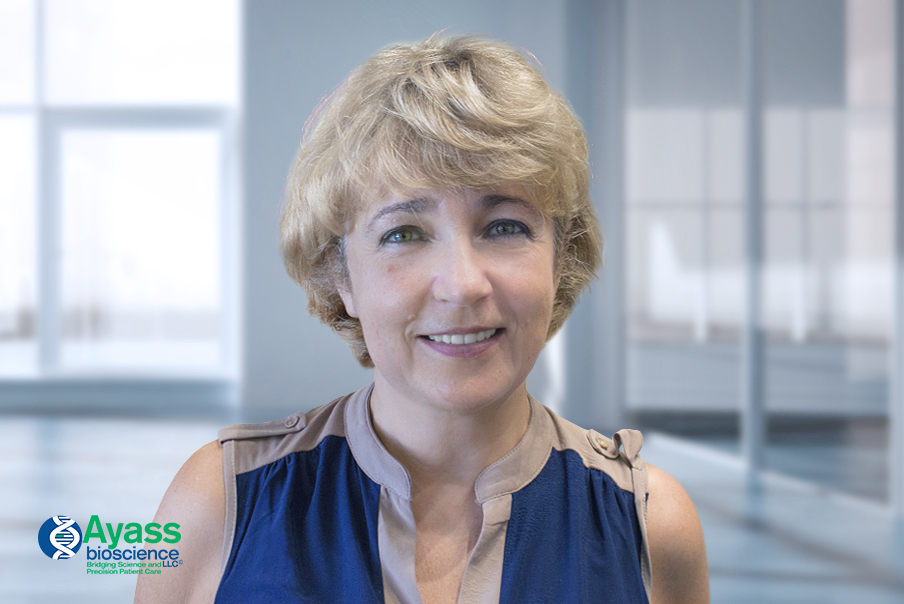
At Ayass Bioscience, she is involved in the design, development, and validation of high-complexity molecular testing ranging from next generation sequencing to array-based genotyping assays. She is participating actively in a transcriptome sequencing project essential for interpreting the functional elements of the genome, revealing the molecular constituents of cells and tissues, and understanding development and disease.
Her major research project is the development of aptamers that bind a specific target molecule, or family of target molecules. She has successfully developed an aptamer for the detection of D-dimer levels in blood sample and a Thrombin aptamer as a potential anticoagulant agent. Recently, she led the project to develop stable and biologically active aptamers that inhibit SARS-CoV-2 infection. A series of single-stranded DNA aptamers has been developed to specifically bind to the trimeric S protein of SARS-CoV-2, blocking its interaction with the ACE2 receptor and consequently inhibiting infection. The selected aptamers could be an innovative therapy for the treatment of COVID-19.
She is also part of the proteomics team for identification and validation of new biomarkers for autoimmune diseases, cardiac diseases, coagulation, and other disorders.
Natalya earned her master’s degrees in Biophysics at Saint Petersburg State University in Saint Petersburg, Russia, and her Ph.D. in Molecular Biology at the Institute of Protein Research of the Russian Academy of Sciences. After receiving her Ph.D., Natalya worked as Senior Research Scientist at the Biological Center of Russian Academy of Sciences. Subsequently, she moved to the U.S. where she worked as a Research Scientist at the University of Texas, Dallas, and then worked as a Senior Research Scientist for a biotechnology company before joining Dr. Ayass’s team as their Molecular Biology scientist.
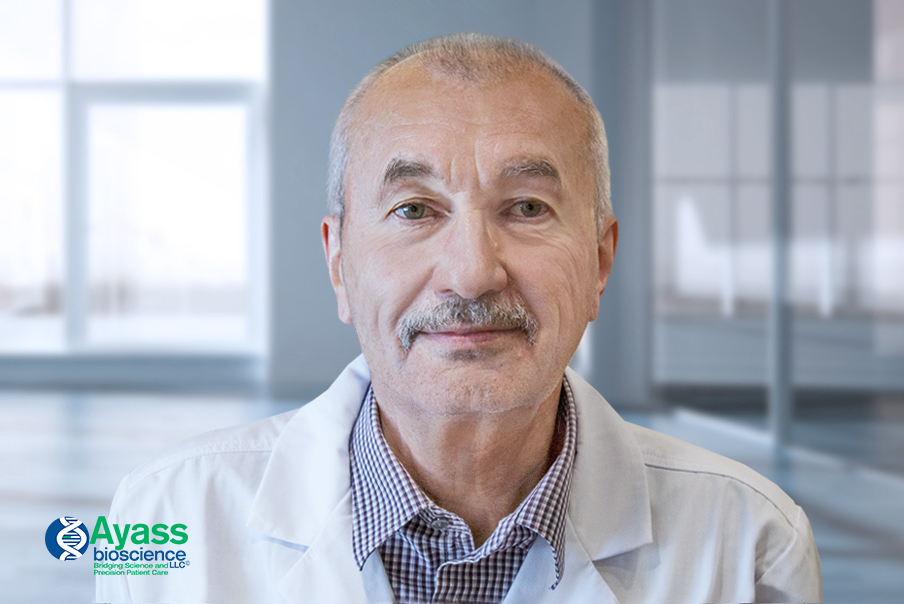
Victor is a valuable member of the Ayass Bioscience research team. He participates in all research projects utilizing his knowledge in biochemistry, immunochemistry, and molecular biology. He is one of the key scientists working on the Aptamer project. He contributed significantly to the development of aptamers for detecting D-dimer levels in blood samples and Thrombin aptamers as a potential anticoagulant agent. In recent times, he played a major role in a project aimed at developing stable and biologically active aptamers for inhibiting SARS-CoV-2 infection. A set of single-stranded DNA aptamers has been developed to bind selectively to the trimeric S protein of SARS-CoV-2, disrupting its interaction with the ACE2 receptor and thereby hindering infection. He has shown that selected aptamers were not only able to bind to trimer S protein of Wuhan original strain, but also were able to bind to trimer S proteins of Delta, Delta plus, Alpha, Lambda, Mu, and Omicron and inhibit their binding to ACE2 receptor in Vero E6 cell line. These carefully chosen aptamers hold promise as an innovative therapeutic approach for managing COVID-19.
Victor earned his Master’s degree in Biophysics at Lomonosov Moscow State University and his Ph.D. in Biochemistry at Shemyakin-Ovchinnikov Institute of Bioorganic Chemistry of the Russian Academy of Sciences. Victor worked in the Biological Center of the Russian Academy of Sciences. After he moved to the U.S., he held a research scientist position at the Cornell University Medical Center and at the UT Southwestern Medical Center. He joined the Ayass BioScience team as a Research Scientist.
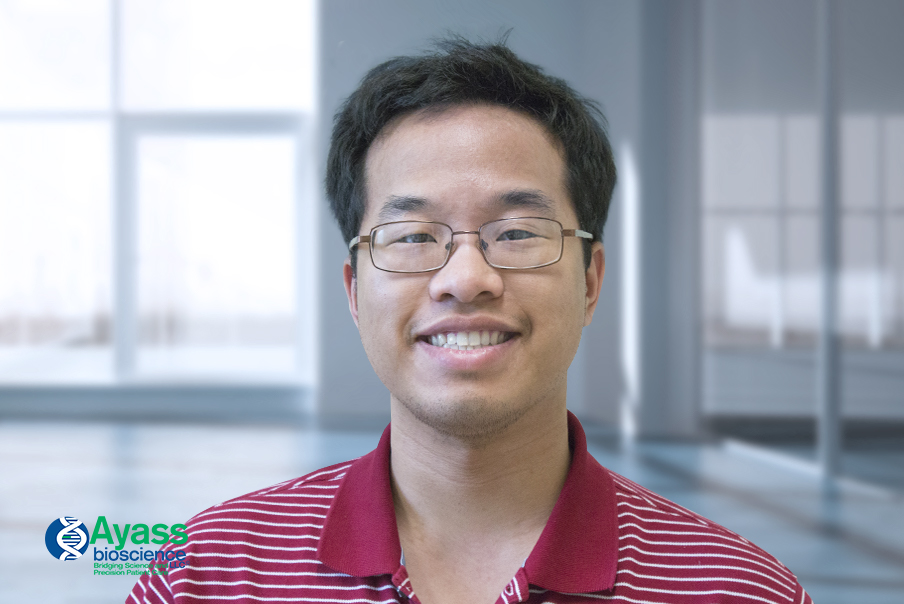
He joined Ayass Bioscience after receiving his Bachelor’s in Computational and Applied Mathematics from Rice University and his Master’s in Bioinformatics from the University of Texas Health Science Center at Houston.
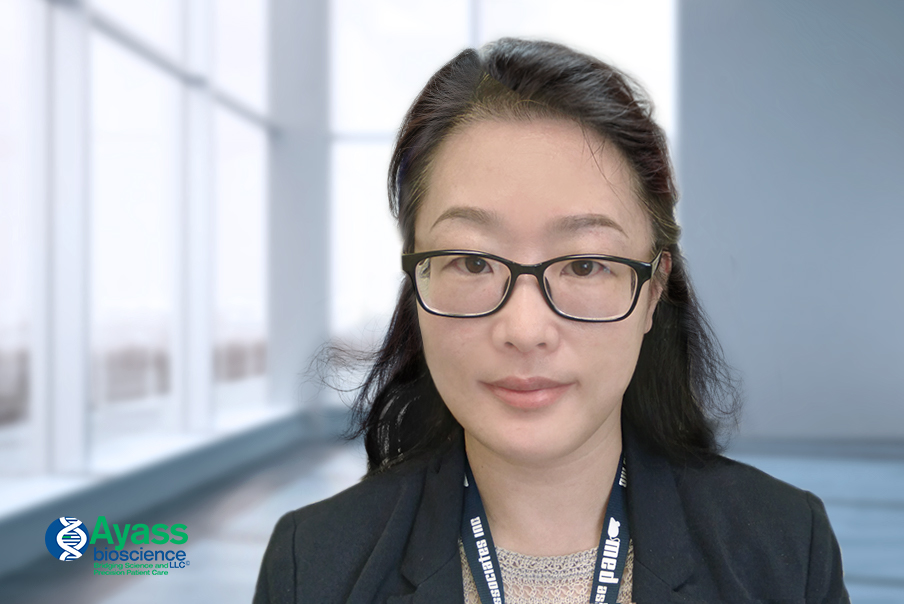
The opportunity presented by Ayass Bioscience enabled her to put her expertise in experimental design, planning, data analysis, modeling and projections, bioanalytical parameter determinations, and validation of various assays and clinical sample bioanalysis. She is working on the research of the discovery of biomarkers in COVID-19 diagnostic testing.
Jin received her M.D. degree from the school of Medicine, China Three Gorges University, China. She earned her Master’s degree in Pharmacology and Toxicology from the University of Mississippi Medical Center and MPH degree in Epidemiology and Biostatistics from the School of Public Health, Jackson State University after moving to the United States.
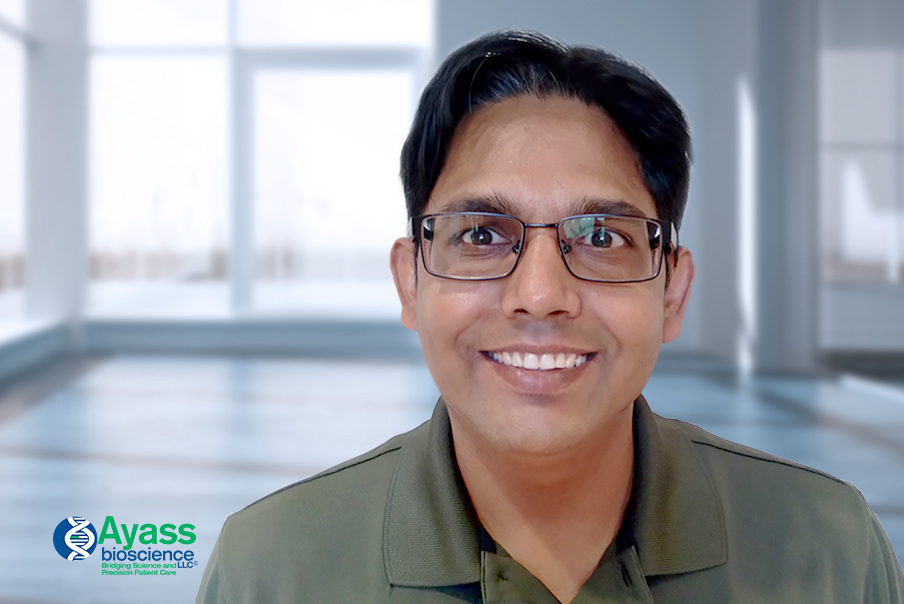
Dr. Tripathi is also responsible for designing an immune profile flow cytometry panel for COVID-19 patients and correlating the findings to mass spectrometry.
Before joining Ayass Bioscience, Dr. Tripathi worked at AbeXXa Biologics, Inc. His prior appointment was as a Senior Research Fellow at Mayo Clinic, Scottsdale, AZ. He also received postdoctoral training from UNT Health Science Center at Fort Worth and Baylor Institute for Immunology Research, BSWRI at Dallas. Dr Tripathi earned his Ph.D. degree in Biochemistry at Aligarh Muslim University, India. He also holds a Master of Science degree in Biotechnology from CSJM University, India and a Bachelor of Science (Hons.) degree in Chemistry from AMU, India.
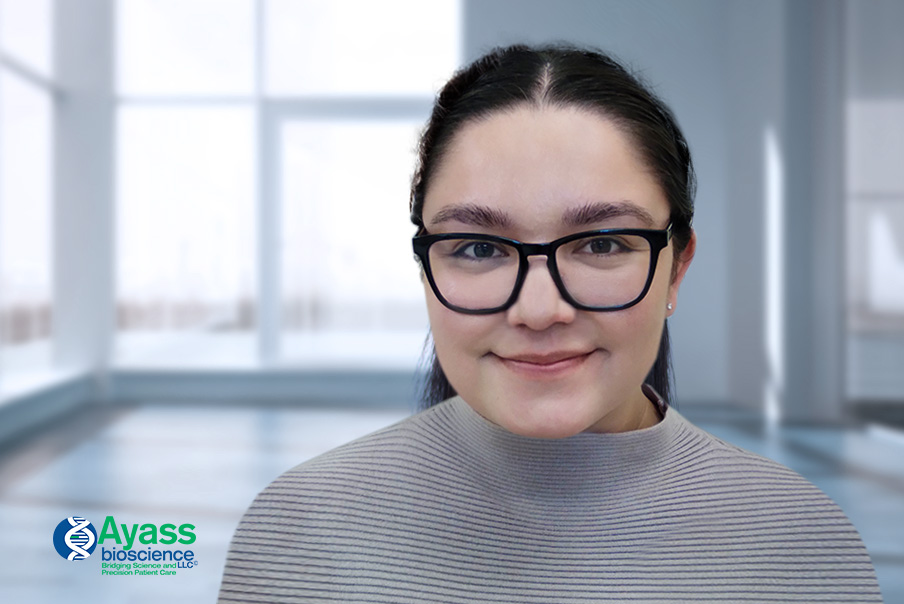
Before joining the Ayass Bioscience,LLC team, Kristen worked as a Research Assistant where she explored different pathologies via machine learning and data mining techniques. One of her projects aimed to better understand post translational modifications in the context of neurodegenerative disease and was successfully able to discover a novel motif conserved within the FICD domain of the target. Kristen also worked on determining the structure and function of unknown classes of GPCRs and tested their different isoforms against known ligands via protein-ligand docking. Currently, she is working on T-Cell profiling to better understand the pathology of Rheumatoid Arthritis.
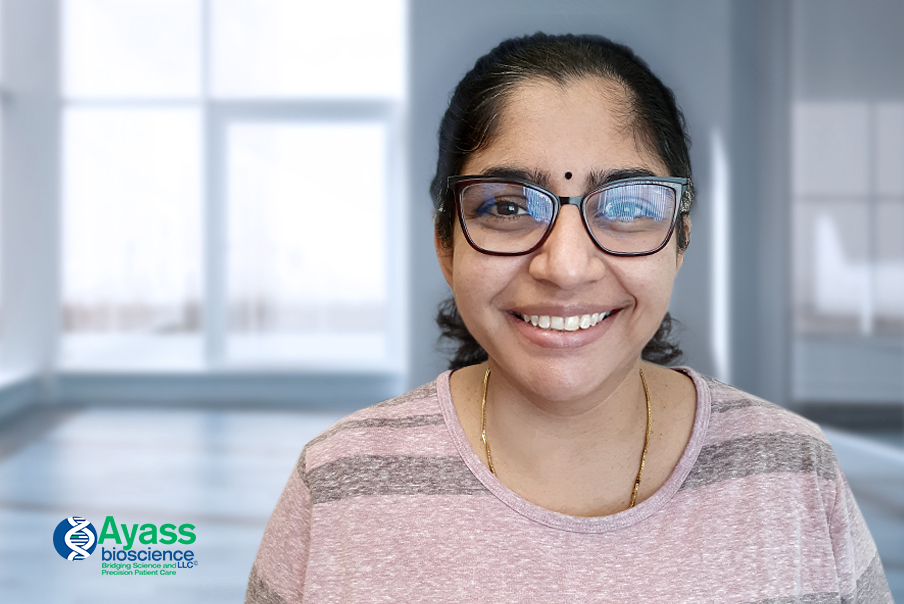
Ramya has obtained her Doctorate from Cochin University of Science and Technology, India, for her studies on using molecular techniques in the field of environmental science. Ramya has done research in utilizing metagenomic, metatranscriptomics, metaproteomics, bioinformatics and multivariate statistical analysis to understand the expression of genes and their functions. Ramya completed her Masters in Biotechnology from Bharathiar University, India and her project was focused on identification of complement proteins using native 2D PAGE electrophoresis. Ramya has joined the Ayass Bioscience LLC in September 2021, after her doctorate and has been part of the Ayass research and development team.
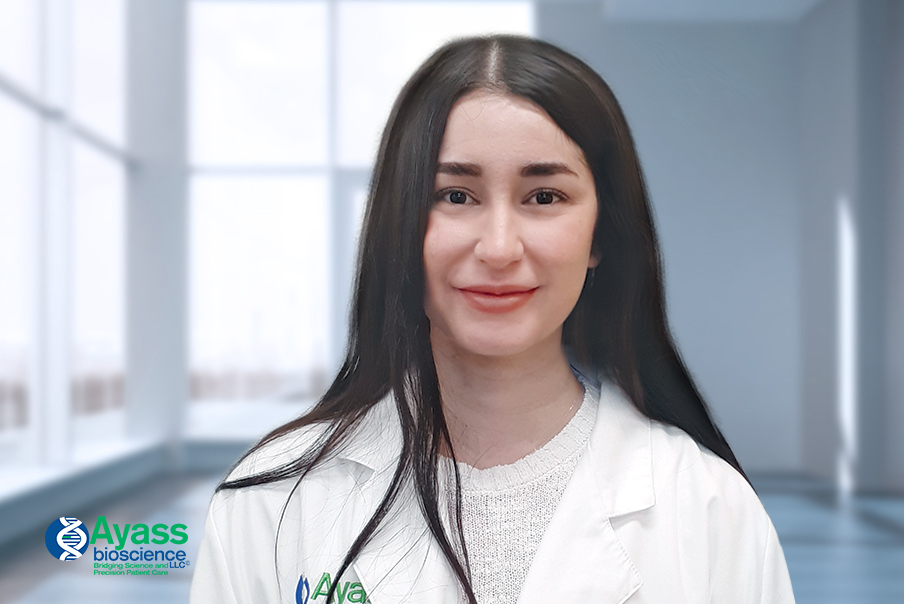
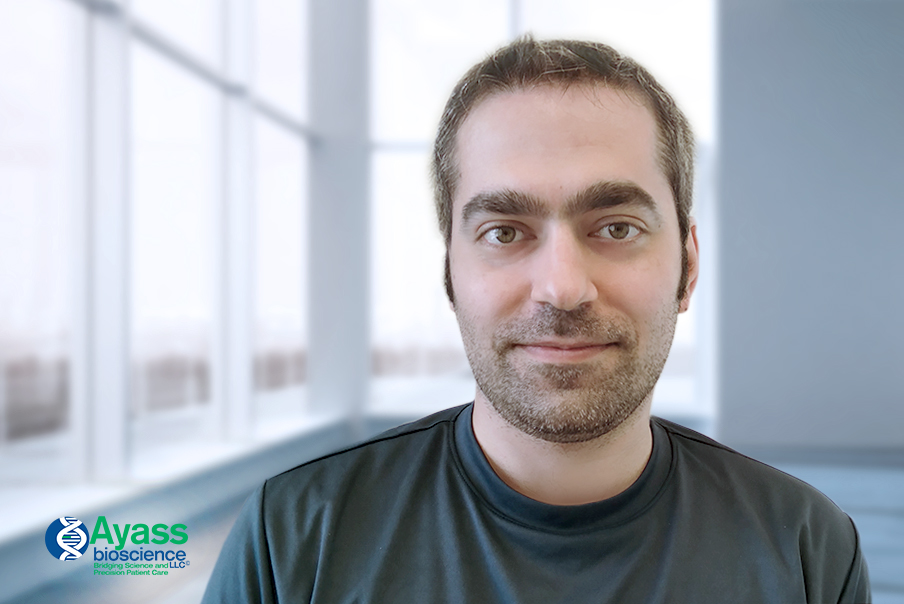
Amir is a Bioinformatics Analyst at Ayass Bioscience with a Master’s degree in Medical Physics and Imaging from Vienna University of Technology. He has worked as a project assistant at the Medical University of Vienna on a project to detect and compensate for motion during PET imaging of patients with lung cancer using a Data-driven method that captures the respiratory signal from the patient’s data and utilizes this data to track the respiratory motion.
Amir is enthusiastic about Machine learning, Deep Learning and Statistical Analysis and is involved with processing of COVID-19 tests, Next Generation Sequencing data as well as analysis of proteomics and medical data in Ayass Bioscience, LLC.
If you have any questions about Ayass BioScience, LLC Team or their qualifications, please call today at 972-668-6005 or fill out our contact form on the bottom of this page. We will answer any question you might have.

